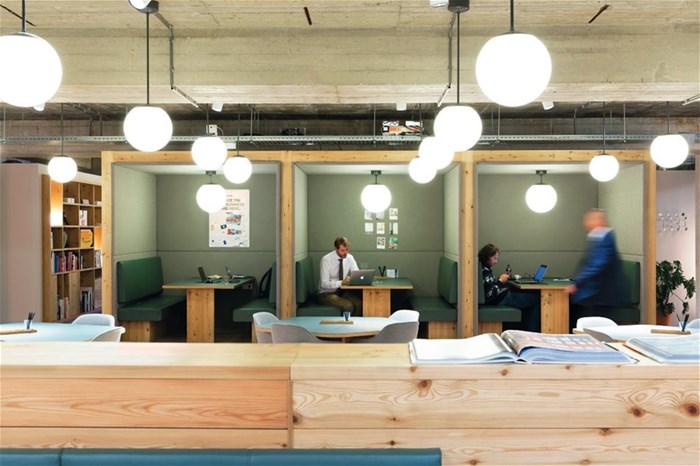
Top stories






More news

ESG & Sustainability
#AGES2026: How to back Africa's next-gen green and blue entrepreneurs
















Logistics & Transport
#Budget2026: Road freight logistics and what it means for consumers


Forced lockdowns translating into remote working from home has put the spotlight on how the virus is changing the way we work. The truth is that the trend towards increased flexible working has been in the forefront for many years, and the Covid-19 crisis is merely speeding up the process. Many businesses are seeing the opportunity to reduce costs on office premises during this challenging time, to alleviate some of the financial pressure.
A substantial portion of employees have relocated to home, but the majority will still need to go back to the office in the immediate future. South Africa, whilst struggling with a recession, has also had to embrace the forced remote working through the lockdowns. The evolving technology is making these transitions more possible than ever before. It is, therefore, not surprising that business leaders in South Africa are seriously considering reducing office space use.
Flexible workspace was already on a strong growth curve before the pandemic, with property consultancy JLL forecasting last year that it would take up 30% of total office workspace by the year 2030. Covid-19 has seriously disrupted the office market and has expedited this migration. “The coronavirus pandemic is putting economic pressure on tenants but also making it hard for them to forecast their property needs, which is driving a preference for flexible space,” says Joanne Bushell, managing director for South Africa IWG Plc, the largest flexible workspace provider in the world.
The positive experience that many occupiers are having with working from home is now being considered a potential major turning point in how they think about real estate. Some companies are talking about a return to a ‘hub and spoke’ model with a higher quantity of smaller offices in suburban locations. This provides an opportunity to accommodate everyone.
Not everyone is cut out for home working, and this is where suburban serviced offices and flexible spaces could be the right fit. The benefits for businesses are many, with flexibility being the biggest. Without being tied to a rigid fixed lease, companies can change their workspace set-up in line to their current needs, which is better for their bottom line.
Whilst the financial benefits of choosing a suburban office over one in a city centre location is a plus, the concept of accessibility is now becoming equally important. It means no more hours lost in rush-hour traffic jams, as well as ample parking and quicker access to airports and other towns and cities.
Across the world right now, people are moving out of densely populated major cities in favour of either working from home or finding alternative office space outside of central business districts. Smart leaders don’t want their staff on crowded taxis, in cramped elevators or mixing in busy open-plan offices. Instead, they are looking for more spacious premises in the suburbs to help their employees stay socially distanced.
The reality is that teams still need places to come together and safely connect with their colleagues and clients. With the advantage of having much more space in suburbia, modern office complexes in suburbs can offer open spaces and even roof-top terraces and gardens.
Now that employees have had a taste of commute-free days, the thought of cramming on to public transport or sitting in traffic for hours, is less inviting than it ever was. Satellite offices are becoming an ideal choice for corporations who still want to keep their headquarters in a prime city location, but also want more office space in outer city areas.
Aside from being more cost-effective – rent is cheaper in the suburbs – moving a business into other neighbourhoods can also have benefits for the local community. When a company moves to an area, it brings in a raft of people – employees, clients, suppliers and customers – which, in turn, will help the location to grow and prosper, with new facilities, shops and restaurants that bring economic growth to outer areas of a city.
All employees benefit from having a shorter commute. This also enhances your company’s ability to become a more attractive prospect for new talent who are reluctant to spend hours commuting to the city.
It makes sense for companies to move towards flexible office space in suburban locations, which offers the best of both worlds for their employees. And, if anything, this year has shown the business world that the corporate wheels can keep turning even if you’re not in the heart of the business district.
While the future could see more companies opting for a smaller head office in a central location, alongside a clutch of well-placed satellite hubs, the need for smart, modern office spaces with cutting edge facilities is essential to business success.
IWG is the global operator of leading workspace providers. Our companies help more than 2.5 million people and their businesses to work more productively. We do so by providing a choice of professional, inspiring and collaborative workspaces, communities and services.
Digitalisation and new technologies are transforming the world of work. People want the personal productivity benefits of living and working how and where they want. Businesses want the financial and strategic benefits. Our customers are start-ups, small and medium-sized enterprises, and large multinationals. With unique business goals, people and aspirations. They want workspaces and communities to match their needs. They want choice.
Through our companies we provide that choice, and serve the whole world of work: Regus, Spaces, No18, Basepoint, Open Office and Signature. We create personal, financial and strategic value for businesses of every size. From some of the most exciting companies and well-known organisations on the planet, to individuals and the next generation of industry leaders. All of them harness the power of flexible working to increase their productivity, efficiency, agility and market proximity.